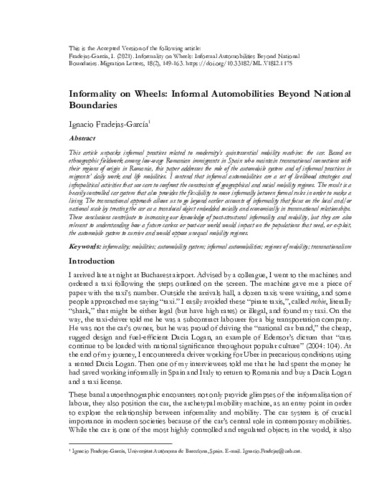Informality on Wheels: Informal Automobilities Beyond National Boundaries
Author:
Subject:
informality
cars
transnationalism
networks
informal practices
mobilities
regimes of mobility
informal automobilities
automobility system
Publication date:
Editorial:
Transnational Press London
Publisher version:
Citación:
Descripción física:
Abstract:
This article unpacks informal practices related to modernity’s quintessential mobility machine: the car. Based on ethnographic fieldwork among low-wage Romanian immigrants in Spain who maintain transnational connections with their regions of origin in Romania, this paper addresses the role of the automobile system and of informal practices in migrants’ daily work and life mobilities. I contend that informal automobilities are a set of livelihood strategies and infrapolitical activities that use cars to confront the constraints of geographical and social mobility regimes. The result is a heavily controlled car system that also provides the flexibility to move informally between formal rules in order to make a living. The transnational approach allows us to go beyond earlier accounts of informality that focus on the local and/or national scale by treating the car as a translocal object embedded socially and economically in transnational relationships. These conclusions contribute to increasing our knowledge of post-structural informality and mobility, but they are also relevant to understanding how a future carless or post-car world would impact on the populations that need, or exploit, the automobile system to survive and would oppose unequal mobility regimes.
This article unpacks informal practices related to modernity’s quintessential mobility machine: the car. Based on ethnographic fieldwork among low-wage Romanian immigrants in Spain who maintain transnational connections with their regions of origin in Romania, this paper addresses the role of the automobile system and of informal practices in migrants’ daily work and life mobilities. I contend that informal automobilities are a set of livelihood strategies and infrapolitical activities that use cars to confront the constraints of geographical and social mobility regimes. The result is a heavily controlled car system that also provides the flexibility to move informally between formal rules in order to make a living. The transnational approach allows us to go beyond earlier accounts of informality that focus on the local and/or national scale by treating the car as a translocal object embedded socially and economically in transnational relationships. These conclusions contribute to increasing our knowledge of post-structural informality and mobility, but they are also relevant to understanding how a future carless or post-car world would impact on the populations that need, or exploit, the automobile system to survive and would oppose unequal mobility regimes.
Patrocinado por:
This article was supported by the author’s FPI grant (BES-2016-076859), which is co-funded by the European Social Fundand the Ministry of Economyand Competitiveness, Government of Spain. I thank the unconditional support and wise advice of Miranda J. Lubbers and José Luis Molina, the principal investigators of the ORBITS project, which has also supported this study and is funded by the Ministry of Economy and Competitiveness, Government of Spain (MINECO-FEDER: CSO2015-68687-P, 2016-2020)
Collections
- Artículos [37321]
- Sociología [137]
Files in this item

Métricas
Compartir
Estadísticas de uso
Metadata
Related items
Showing items related by title, author, creator and subject.
-
Para leer el Informe de Ley Agraria de Jovellanos
Llombart Rosa, Vicent A.; Ocampo Suárez-Valdés, Joaquín Carlos (Asociación Asturiana de Estudios Económicos, 2012)
(Asociación Asturiana de Estudios Económicos, 2012)


